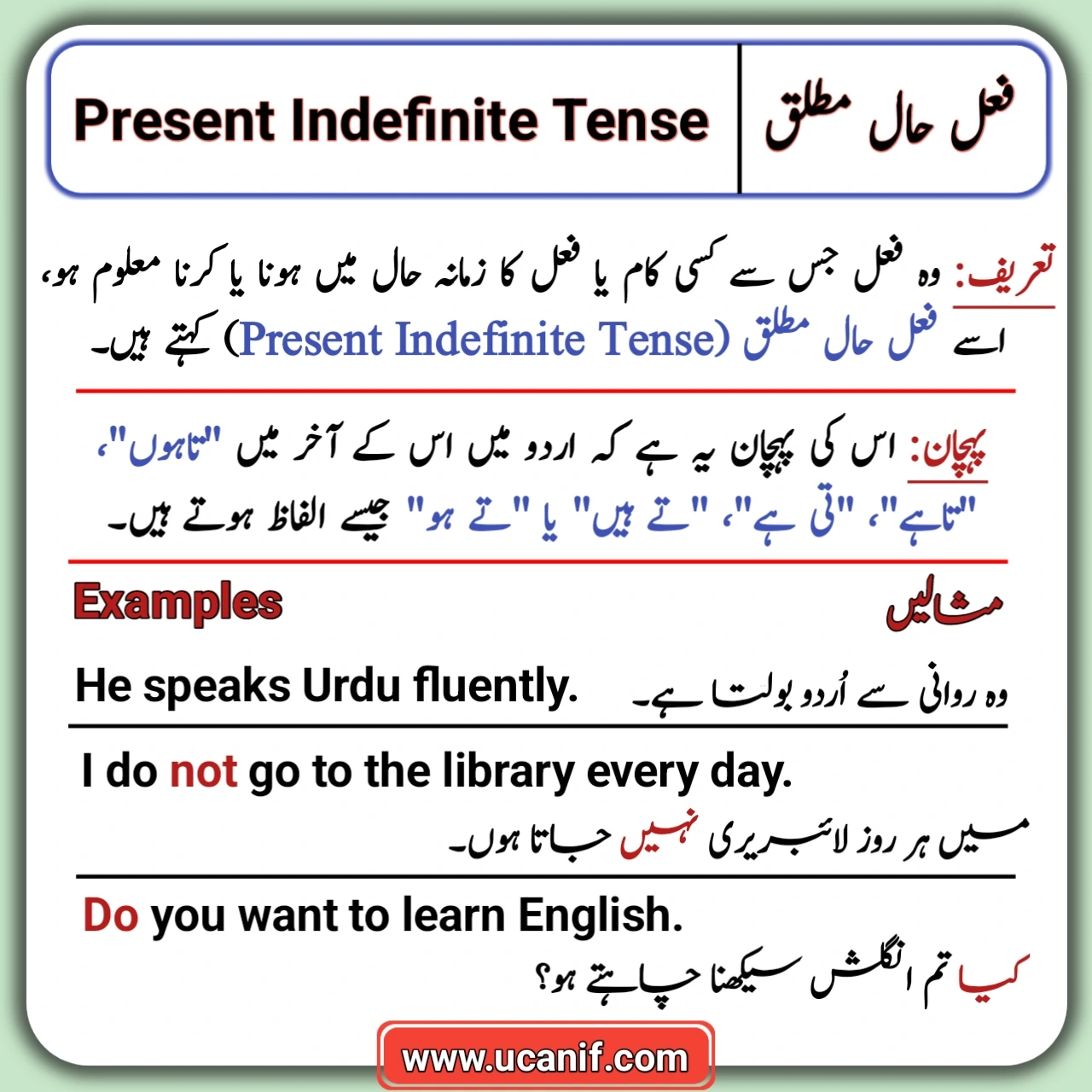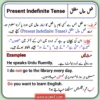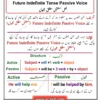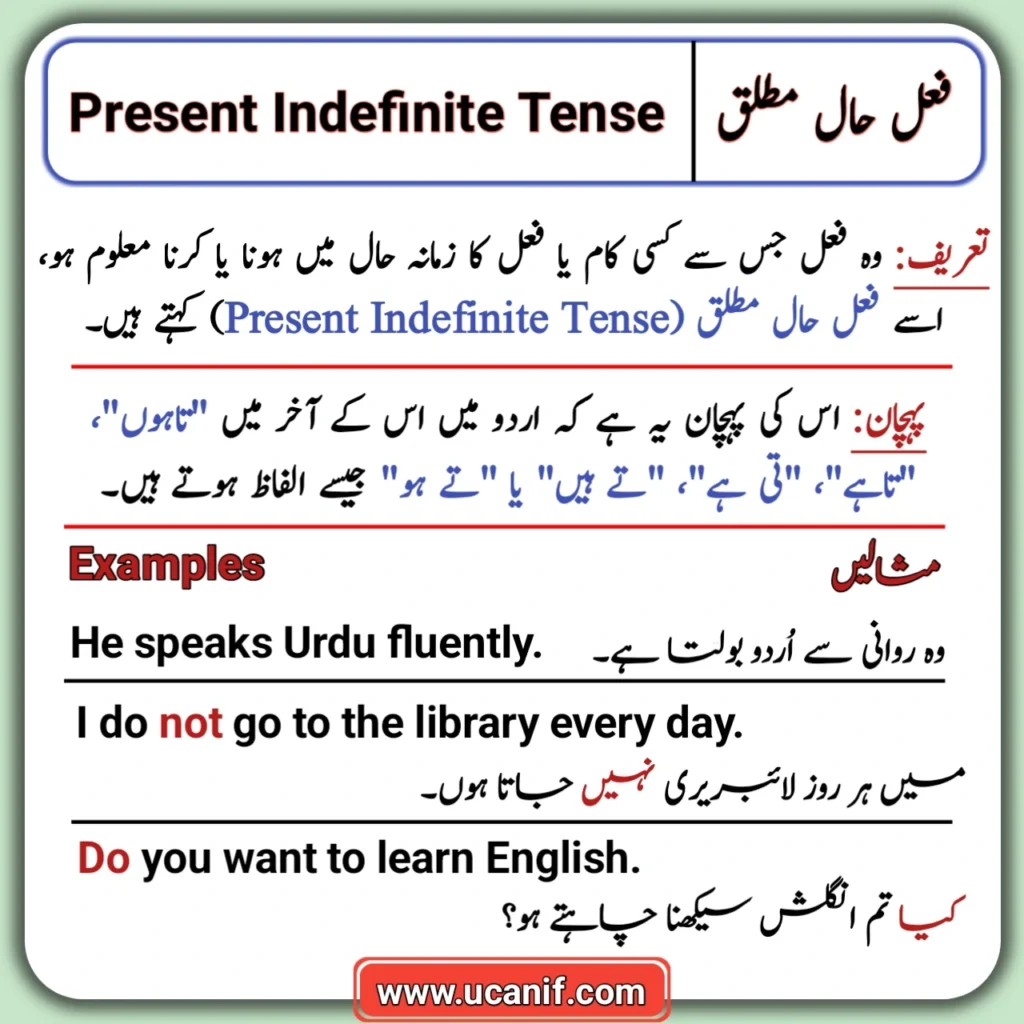
Present Indefinite Tense in Urdu – Rules, Exercises & 70+ Examples | فعل حال مطلق
English grammar samajhna mushkil lagta hai? Yahan se asaan ho jata hai.
Present Indefinite Tense in Urdu & English grammar ka sab se important tense hai jo daily habits, routines aur general facts batane ke liye use hota hai, is liye har student ke liye ise samajhna bohat zaroori hota hai. Present Indefinite Tense ko Urdu me فعل حال مطلق kehte hain aur is lesson me aap simple rules, sentence structure, exercises aur 70+ easy daily life examples ke sath is tense ko asaani se seekhenge. Urdu me is tense ki pehchan yeh hai ke sentences ke akhir me aksar تا ہے، تی ہے، تے ہیں jaise alfaaz aate hain.
The Present Indefinite Tense (also called Simple Present) expresses habits, universal truths, or regular actions. In Urdu, it is called فعل حال مطلق.
For more details about English tenses, you can visit the Cambridge English Grammar Guide
Present Indefinite Tense in Urdu (Positive Sentences) / مثبت جملے
پہچان: اس کی پہچان یہ ہے کہ اردو میں اس کے آخر میں “تاہوں”، “تاہے”، “تی ہے”، “تے ہیں” یا “تے ہو” جیسے الفاظ ہوتے ہیں۔ جیسے:
• میں محنت کرتاہوں۔
• وہ پڑھتا ہے۔
• وہ پوچھتی ہے۔
• ہم سیکھتے ہیں۔
• تم آرام کرتے ہو۔
English Explanation
Rule: Use the first form of the verb in positive sentences.
Structure: Subject + Verb (1st Form) + Object
Example:
I write a letter. → میں ایک خط لکھتا ہوں۔
اہم قاعدہ
فعل حال مطلق کے تمام جملوں میں فعل کی First Form/Base Form کا استعمال ہوتا ہے۔
ترکیب: فاعل + فعل + مفعول
مثلاً: میں ایک خط لکھتا ہوں → I write a letter.
| English | Urdu |
|---|---|
| The sun shines. | سورج چمکتا ہے۔ |
| She drinks tea. | وہ چائے پیتی ہے۔ |
| He reads books. | وہ کتابیں پڑھتا ہے۔ |
| They play cricket. | وہ کرکٹ کھیلتے ہیں۔ |
| We study together. | ہم اکٹھے پڑھتے ہیں۔ |
📘 Infographic Summary – Present Indefinite Tense in Urdu
- 🧠 Tense: Present Indefinite (Simple Present)
- 💡 Verb Form: Use Base / First Form of the Verb
- 👥 Subjects (I, You, We, They): No ‘s’ or ‘es’
- 👤 He / She / It / Singular Noun: Add ‘s’ or ‘es’
- 🗣 Example: He plays football → وہ فٹبال کھیلتا ہے۔
- 🌍 Usage: Daily routines, habits, universal facts
Present Indefinite Tense in Urdu and English– Negative Sentences
Learn how to make negative sentences in Present Indefinite Tense in Urdu and English with examples, rules, and quiz.
The negative sentences in the Present Indefinite Tense are formed using Do not (Don’t) or Does not (Doesn’t) before the base form of the verb. These sentences express actions that do not happen regularly or are denied.
منفی جملے – Present Indefinite Tense in Urdu
منفی جملوں کے قاعدے (Rules):
ترکیب (Structure): فاعل + Does not / Do not + فعل + مفعول
English Rule
Structure: Subject + Do not / Does not + Verb (1st Form) + Object
Example: He does not eat vegetables.
(وہ سبزی نہیں کھاتا ہے)
| Formula | English | Urdu |
|---|---|---|
| Subject | He | وہ |
| Does not | Does not | نہیں |
| Verb | Eat | کھاتا ہے |
| Object | Vegetables | سبزی |
اہم قاعدہ
منفی جملوں میں “Does not” یا “Do not” فعل سے پہلے لگایا جاتا ہے۔
He/She/It کے ساتھ “Does not” استعمال ہوتا ہے۔
I/We/You/They کے ساتھ “Do not” استعمال ہوتا ہے۔
| Affirmative | Negative | Urdu Translation |
|---|---|---|
| I play football. | I do not play football. | میں فٹبال نہیں کھیلتا ہوں۔ |
| He eats vegetables. | He does not eat vegetables. | وہ سبزی نہیں کھاتا ہے۔ |
Negative Sentences of Present Indefinite Tense in Urdu
| English | Urdu |
|---|---|
| The sun does not set in the east. | سورج مشرق میں نہیں غروب ہوتا ہے۔ |
| The bird does not fly at night. | پرندہ رات کو نہیں اڑتا ہے۔ |
| The cat does not like milk. | بلی کو دودھ پسند نہیں ہے۔ |
| She does not watch TV. | وہ ٹی وی نہیں دیکھتی۔ |
| He does not eat meat. | وہ گوشت نہیں کھاتا۔ |
| He does not run fast. | وہ تیزی سے نہیں دوڑتا ہے۔ |
| The flower does not need much water. | پھول کو زیادہ پانی کی ضرورت نہیں ہوتی۔ |
| The dog does not bark at night. | کتا رات کو نہیں بھونکتا۔ |
| She does not speak French. | وہ فرانسیسی نہیں بولتی۔ |
| He does not play soccer. | وہ فٹبال نہیں کھیلتا۔ |
مزید مثالیں:
| English | Urdu |
|---|---|
| You do not play loud music. | تم بلند موسیقی نہیں بجاتے۔ |
| We do not visit crowded places. | ہم بھیڑ والی جگہوں پر نہیں جاتے۔ |
| You do not watch horror movies. | آپ ڈراؤنی فلمیں نہیں دیکھتے۔ |
| We do not eat junk food. | ہم جنک فوڈ نہیں کھاتے ہیں۔ |
| We do not play video games all day. | ہم پورے دن ویڈیو گیمز نہیں کھیلتے۔ |
| You do not eat spicy food. | تم تیکھا کھانا نہیں کھاتے۔ |
| We do not visit relatives on weekdays. | ہم ہفتے کے دن رشتہ داروں کے پاس نہیں جاتے۔ |
| You do not speak loudly in class. | تم کلاس میں بلند آواز میں نہیں بولتے۔ |
| We do not like rainy days. | ہمیں بارش کے دن پسند نہیں ہیں۔ |
| You do not watch TV during exams. | تم امتحانوں کے دوران ٹی وی نہیں دیکھتے۔ |
🚫 Infographic Summary – Negative Sentences
- Use “Do not” with I, We, You, They
- Use “Does not” with He, She, It, or singular nouns
- Verb remains in first (base) form after Do/Does not
- Does not = Doesn’t | Do not = Don’t
- Example: He doesn’t like coffee → وہ کافی پسند نہیں کرتا۔
Present Indefinite Tense in Urdu and English– Interrogative Sentences
The interrogative sentences in Present Indefinite Tense are formed using Do or Does at the beginning of the sentence. These sentences are used to ask questions about habitual actions or facts.
سوالیہ جملے – Present Indefinite Tense in Urdu
سوالیہ جملوں کے قاعدے (Rules):
ترکیب (Structure): Do / Does + فاعل + فعل + مفعول؟
English Rule
Structure: Do / Does + Subject + Verb (1st Form) + Object?
Example: Does he eat vegetables?
(کیا وہ سبزی کھاتا ہے؟)
| Formula | English | Urdu |
|---|---|---|
| Do/Does | Does | کیا |
| Subject | He | وہ |
| Verb | Eat | کھاتا ہے |
| Object | Vegetables | سبزی |
اہم قاعدہ
He/She/It کے ساتھ “Does” استعمال ہوتا ہے۔
I/We/You/They کے ساتھ “Do” استعمال ہوتا ہے۔
Verb ہمیشہ base form میں رہتا ہے، سوالیہ جملے میں بھی۔
| Affirmative | Interrogative | Urdu Translation |
|---|---|---|
| I play football. | Do I play football? | کیا میں فٹبال کھیلتا ہوں؟ |
| He eats vegetables. | Does he eat vegetables? | کیا وہ سبزی کھاتا ہے؟ |
Interrogative Sentences of Present Indefinite Tense in Urdu
| English | Urdu |
|---|---|
| Does the sun rise in the east? | کیا سورج مشرق میں نکلتا ہے؟ |
| Do birds fly at night? | کیا پرندے رات کو اڑتے ہیں؟ |
| Does the cat like milk? | کیا بلی کو دودھ پسند ہے؟ |
| Does she watch TV? | کیا وہ ٹی وی دیکھتی ہے؟ |
| Does he eat meat? | کیا وہ گوشت کھاتا ہے؟ |
مزید مثالیں:
| English | Urdu |
|---|---|
| Do you play loud music? | کیا تم بلند موسیقی بجاتے ہو؟ |
| Do we visit crowded places? | کیا ہم بھیڑ والی جگہوں پر جاتے ہیں؟ |
| Do you watch horror movies? | کیا آپ ڈراؤنی فلمیں دیکھتے ہیں؟ |
| Do we eat junk food? | کیا ہم جنک فوڈ کھاتے ہیں؟ |
| Do we play video games all day? | کیا ہم پورے دن ویڈیو گیمز کھیلتے ہیں؟ |
❓ Infographic Summary – Interrogative Sentences
- Use “Do” with I, We, You, They
- Use “Does” with He, She, It, or singular nouns
- Verb remains in first (base) form after Do/Does
- Does not = Doesn’t | Do not = Don’t in negative, but in question we use Do/Does
- Example: Does he like coffee? → کیا وہ کافی پسند کرتا ہے؟
Present Indefinite Tense in Urdu – FAQs
Here are the most common questions about Present Indefinite Tense in Urdu and English. Test yourself with a quiz, write your own sentences, and share this lesson with friends!
❓ Frequently Asked Questions (FAQs)
| Question (English) | Answer (English) | سوال (اردو) | جواب (اردو) |
|---|---|---|---|
| What is Present Indefinite Tense? | It expresses daily routines, habits, or general truths. | Present Indefinite Tense کیا ہے؟ | یہ روزمرہ کے کام، عادات یا عمومی حقائق ظاہر کرتا ہے۔ |
| Which helping verbs are used? | We use “Do” and “Does”. | کون سے مددگار فعل استعمال ہوتے ہیں؟ | ہم “Do” اور “Does” استعمال کرتے ہیں۔ |
| When do we use “Does”? | With He, She, It, or singular nouns. | “Does” کب استعمال ہوتا ہے؟ | جب فاعل He, She, It یا واحد اسم ہو۔ |
| Do we add “s” or “es” to verbs? | Yes, in affirmative sentences with He/She/It. | کیا ہم فعل کے آخر میں “s” یا “es” لگاتے ہیں؟ | جی ہاں، اثباتی جملوں میں He/She/It کے ساتھ۔ |
| Does verb change in questions? | No, verb stays in base form after Do/Does. | کیا سوالیہ جملوں میں فعل بدلتا ہے؟ | نہیں، فعل اپنی اصل (base) حالت میں رہتا ہے۔ |
🧠 Present Indefinite Tense in Urdu (Exercises)
Choose the correct option. Each question has one right answer.
- _____ he go to school daily?
- They _____ play cricket on Sundays.
- She _____ like tea.
- _____ you read English books?
- The sun _____ in the west.
- He _____ play the guitar.
- We _____ to the same school.
- _____ they like music?
- My father _____ early every day.
- _____ it rain in summer?
✍️ Practice Box
Write 3 sentences of your own in Present Indefinite Tense (in English or Urdu):
-
 Learn English in Urdu – گھر بیٹھے انگلش سیکھیں
Learn English in Urdu – گھر بیٹھے انگلش سیکھیں -
 Present Indefinite Tense in Urdu – Rules, Exercises & 70+ Examples | فعل حال مطلق
Present Indefinite Tense in Urdu – Rules, Exercises & 70+ Examples | فعل حال مطلق -
 Future Indefinite Tense Passive Voice in Urdu with Examples
Future Indefinite Tense Passive Voice in Urdu with Examples -
 Past Continuous Tense Passive Voice in Urdu with Examples
Past Continuous Tense Passive Voice in Urdu with Examples -
 Past Perfect Tense Passive voice in Urdu with Examples
Past Perfect Tense Passive voice in Urdu with Examples
